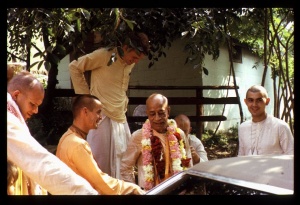CC Madhya 13.145: Difference between revisions
m (1 revision(s)) |
No edit summary |
||
| Line 1: | Line 1: | ||
{{ | [[Category:Sri Caitanya-caritamrta - Madhya-lila Chapter 13|C145]] | ||
<div style="float:left">'''[[Sri Caitanya-caritamrta|Śrī Caitanya-caritāmṛta]] - [[CC Madhya|Madhya-līlā]] - [[CC Madhya 13|Chapter 13: The Ecstatic Dancing of the Lord at Ratha-yātrā]]'''</div> | |||
<div style="float:right">[[File:Go-previous.png|link=CC Madhya 13.144|Madhya-līlā 13.144]] '''[[CC Madhya 13.144|Madhya-līlā 13.144]] - [[CC Madhya 13.146|Madhya-līlā 13.146]]''' [[File:Go-next.png|link=CC Madhya 13.146|Madhya-līlā 13.146]]</div> | |||
{{CompareVersions|CC|Madhya 13.145|CC 1975|CC 1996}} | |||
{{RandomImage}} | |||
==== TEXT 145 ==== | ==== TEXT 145 ==== | ||
<div | <div class="verse"> | ||
nā gaṇi āpana-duḥkha, dekhi’ vrajeśvarī-mukha, | :nā gaṇi āpana-duḥkha, dekhi’ vrajeśvarī-mukha, | ||
vraja-janera hṛdaya vidare | :vraja-janera hṛdaya vidare | ||
kibā māra’ vraja-vāsī, kibā jīyāo vraje āsi’, | :kibā māra’ vraja-vāsī, kibā jīyāo vraje āsi’, | ||
kena jīyāo duḥkha sahāibāre? | :kena jīyāo duḥkha sahāibāre? | ||
</div> | </div> | ||
| Line 14: | Line 18: | ||
==== SYNONYMS ==== | ==== SYNONYMS ==== | ||
<div | <div class="synonyms"> | ||
nā | ''nā gaṇi''—I do not care; ''āpana-duḥkha''—My personal unhappiness; ''dekhi''’—seeing; ''vrajeśvarī-mukha''—the face of mother Yaśodā; ''vraja-janera''—of all the inhabitants of Vṛndāvana; ''hṛdaya vidare''—the hearts break; ''kibā—''whether; ''māra’ vraja-vāsī''—You want to kill the inhabitants of Vṛndāvana; ''kibā''—or; ''jīyāo''—You want to keep their lives; ''vraje āsi''’—coming in Vṛndāvana; ''kena''—why; ''jīyāo''—You let them live; ''duḥkha sahāibāre''—just to cause to suffer unhappiness. | ||
</div> | </div> | ||
| Line 21: | Line 25: | ||
==== TRANSLATION ==== | ==== TRANSLATION ==== | ||
<div | <div class="translation"> | ||
“I do not care for My personal unhappiness, but when I see the morose face of mother Yaśodā and the hearts of all the inhabitants of Vṛndāvana breaking because of You, I wonder whether You want to kill them all. Or do You want to enliven them by coming there? Why are You simply keeping them alive in a state of suffering? | “I do not care for My personal unhappiness, but when I see the morose face of mother Yaśodā and the hearts of all the inhabitants of Vṛndāvana breaking because of You, I wonder whether You want to kill them all. Or do You want to enliven them by coming there? Why are You simply keeping them alive in a state of suffering? | ||
</div> | </div> | ||
__NOTOC__ | |||
<div style="float:right; clear:both;">[[File:Go-previous.png|link=CC Madhya 13.144|Madhya-līlā 13.144]] '''[[CC Madhya 13.144|Madhya-līlā 13.144]] - [[CC Madhya 13.146|Madhya-līlā 13.146]]''' [[File:Go-next.png|link=CC Madhya 13.146|Madhya-līlā 13.146]]</div> | |||
__NOTOC__ | |||
__NOEDITSECTION__ | |||
Revision as of 12:14, 25 August 2021

A.C. Bhaktivedanta Swami Prabhupada
TEXT 145
- nā gaṇi āpana-duḥkha, dekhi’ vrajeśvarī-mukha,
- vraja-janera hṛdaya vidare
- kibā māra’ vraja-vāsī, kibā jīyāo vraje āsi’,
- kena jīyāo duḥkha sahāibāre?
SYNONYMS
nā gaṇi—I do not care; āpana-duḥkha—My personal unhappiness; dekhi’—seeing; vrajeśvarī-mukha—the face of mother Yaśodā; vraja-janera—of all the inhabitants of Vṛndāvana; hṛdaya vidare—the hearts break; kibā—whether; māra’ vraja-vāsī—You want to kill the inhabitants of Vṛndāvana; kibā—or; jīyāo—You want to keep their lives; vraje āsi’—coming in Vṛndāvana; kena—why; jīyāo—You let them live; duḥkha sahāibāre—just to cause to suffer unhappiness.
TRANSLATION
“I do not care for My personal unhappiness, but when I see the morose face of mother Yaśodā and the hearts of all the inhabitants of Vṛndāvana breaking because of You, I wonder whether You want to kill them all. Or do You want to enliven them by coming there? Why are You simply keeping them alive in a state of suffering?